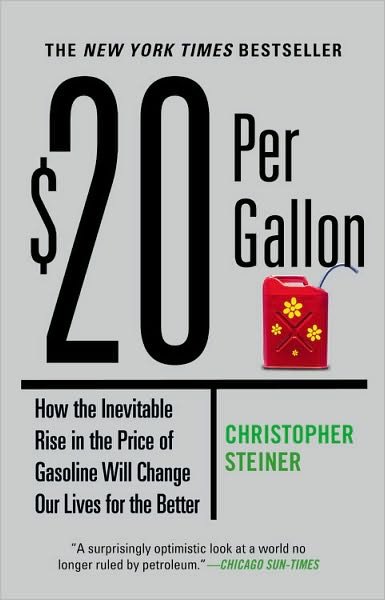Midpack
Give me a museum and I'll fill it. (Picasso) Give me a forum ...
The author doesn't speculate on when gas will reach $20 per gallon, he knows that would be foolish/impossible. And I am sure he doesn't literally mean cars, planes, trains, re-urbanization, food or energy will coincide directly with the stepwise rate of each chapter's $2 increase. I am sure it will all happen gradually.
But we've seen the modest beginnings of this, and IMO there will be dramatic changes. We can argue when gas will become scarcer/more expensive (10 ys, 100 yrs, sooner or later) - but I don't think there's any argument if it will happen, only when. Some of what the author discusses have occurred to all of us I suspect, but there were other outcomes in this book that I hadn't stop to think of.
It's by no means all bad news, in fact the author concludes that while the transition may be painful, we'll all be better off in the end.
For those interested in this sort of thing (admittedly me), I thought it was an interesting thought provoking read, irrespective of whether you agree with the author. It is not a hand-wringing negative scare book.
The $64,000 question for our generation is whether we should be planning for some of this, or won't live to see any of it, I'm inclined to plan for it to some extent. If I'm wrong, at least maybe we've tried to leave the world a slightly better place...
Table of Contents
$4 Prologue: The Road to $20 and Civilization 1
Chapter $6 Society Change and the Dead SUV 17
Chapter $8 The Skies Will Empty 52
Chapter $10 The Car Diminished but Reborn 81
Chapter $12 Urban Revolution and Suburban Decay 113
Chapter $14 The Fate of Small Towns, U.S. Manufacturing Renaissance, and Our Material World 141
Chapter $16 The Food Web Deconstructed 170
Chapter $18 Renaissance of the Rails 198
Chapter $20 The Future of Energy 224
$20 Epilogue 247
But we've seen the modest beginnings of this, and IMO there will be dramatic changes. We can argue when gas will become scarcer/more expensive (10 ys, 100 yrs, sooner or later) - but I don't think there's any argument if it will happen, only when. Some of what the author discusses have occurred to all of us I suspect, but there were other outcomes in this book that I hadn't stop to think of.
It's by no means all bad news, in fact the author concludes that while the transition may be painful, we'll all be better off in the end.
For those interested in this sort of thing (admittedly me), I thought it was an interesting thought provoking read, irrespective of whether you agree with the author. It is not a hand-wringing negative scare book.
The $64,000 question for our generation is whether we should be planning for some of this, or won't live to see any of it, I'm inclined to plan for it to some extent. If I'm wrong, at least maybe we've tried to leave the world a slightly better place...
Table of Contents
$4 Prologue: The Road to $20 and Civilization 1
Chapter $6 Society Change and the Dead SUV 17
Chapter $8 The Skies Will Empty 52
Chapter $10 The Car Diminished but Reborn 81
Chapter $12 Urban Revolution and Suburban Decay 113
Chapter $14 The Fate of Small Towns, U.S. Manufacturing Renaissance, and Our Material World 141
Chapter $16 The Food Web Deconstructed 170
Chapter $18 Renaissance of the Rails 198
Chapter $20 The Future of Energy 224
$20 Epilogue 247
Attachments
Last edited:


